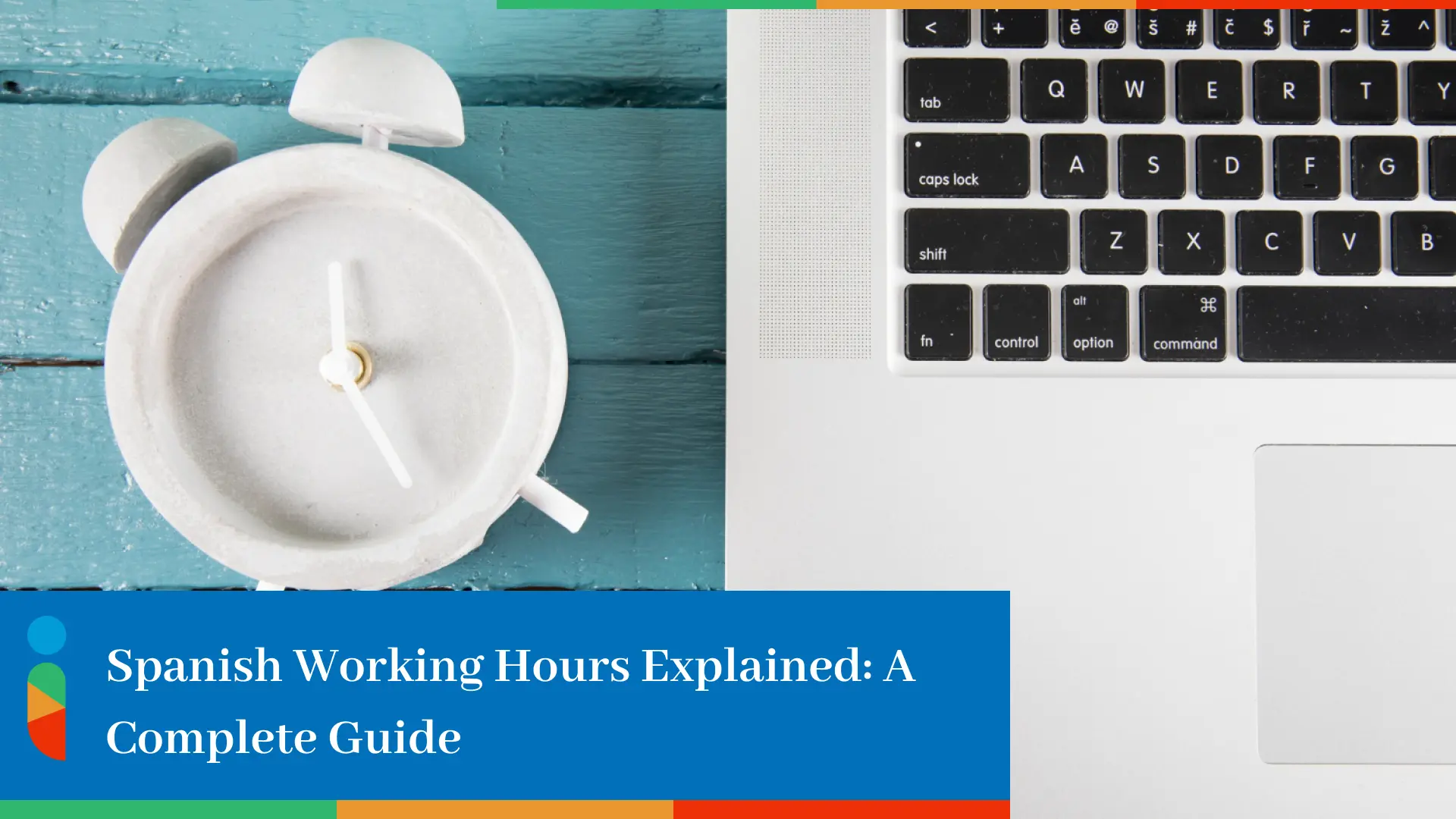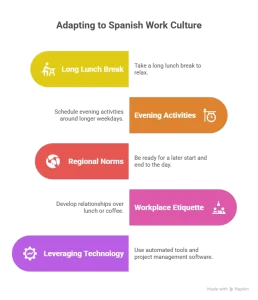Spanish work hours may appear strange to people from other nations, but everyone who lives, works, or operates a business in Spain has to know how they work. The Spanish workday is different from the usual nine-to-five work schedule since it generally includes an extended lunch break, which is known as the siesta.
This break lets you consume food and do private tasks without having to take a full-on snooze, which is less typical lately. The work culture also puts a lot of emphasis on having a good work-life balance. It is shown by the country’s numerous public holidays and the growing popularity of flexible working hours in Spain.
The article gives an extensive overview of Spain’s unique work culture, which will assist overseas workers, employers, and job seekers to do well. By learning about these differences, you may fit in well in the business world and enjoy the way Spaniards work.
Overview of Standard Working Hours in Spain
The normal workweek in Spain is forty hours, which are usually spread out across five days. An extended break in the middle of the day, which is a remnant of the old “siesta,” sometimes divides the workday into two parts.
It gives you time for a substantial lunch and some rest, but a lot of modern offices are going toward a working environment that goes on all day.
In Spain, working hours shifts of more than six hours must have an interval of fifteen minutes, and hours worked each day cannot be more than nine.
What Are the Standard Working Hours in Spain?
In Spain, people usually work in two shifts: from 9 AM to 2 PM, then take a long break, and then come back from 4 PM to 8 PM.
This schedule of work hours in Spain is more common in rural and traditional communities. On the other hand, more modern enterprises and cities are adopting continuous working.
What the Law States About Spain’s Working Hours Each Week
Full-time work is limited by law to forty hours of Spain’s working hours per week. However, a new law aims to lower this to 37.5 hours per week.
You can’t work more than nine hours a day, and if your shift is more than six hours, you have to take a break for fifteen minutes. You can only work eighty hours of overtime a year.
Office Hours in Spain: What Time Does Work Start?
Usually, office hours in Spain start at 9:00 a.m. However, this timing may vary according to the specific sector and regional traditions.
Public sector office hours may differ from the private sector depending on the work and requirements.
Optimize Your HR in Spain – Support for Every Stage of Growth
Spanish Employment Culture and Role of Siesta
The customary two-hour midday nap isn’t as frequent in modern offices, but its legacy lives on. It influenced a long lunch break that lets people rest or eat in the middle of the day, particularly in traditional sectors. However, many businesses are moving to a continuous workday.
Are Siestas Still Being Practiced in Spain Today?
For a lot of Spaniards, especially those who live in major cities or work in offices, the customary noon siesta is mostly a tradition.
A long lunch break is still widespread for Spanish working hours, although the real nap is more usual in rural regions, among older people, or on holidays to avoid the warmest portion of the day.
The Effects of Split Shifts on Work-Life Balance in Spain
Split shifts give you an extended break in the middle of the day, but they also make the end of the workday much later, sometimes until 8 PM or later.
Many Spaniards are willing to deal with the problems associated with working hours in Spain, such as late finishes, getting to work, taking care of kids, and making plans for the evening, in exchange for a slower pace throughout the day.
Spanish Work Culture Priority: Work-Life Balance
Work-life balance is crucial in Spanish society, and workers and executives regard it highly. Spain’s work hours and long public holidays, desire for flexible work hours, and general focus on having fun outside of work show how crucial their cultural value are.
Standards for Paid Time Off and Vacation
Employees are legally entitled to at least twenty-two paid vacation days per year, and several public holidays. A significant number of people in Spain take long vacations in August.
These generous policies for office hours in Spain are an important part of the wide range of employee perks, such as a high value on work-life balance.
Adaptable Working Hours in Spain
More organizations in Spain are allowing their employees to work from home and have shorter workweeks.
The government supports flexibility, especially for families with children, with new laws that aim to improve work-life balance and promote employee health outside of regular work hours in Spain.
Impact of Public Holidays on Spanish Work Hours
Spain has a lot of public holidays, both national and regional. Most sectors are closed for business hours in Spain on these specific days. It means that many businesses are closed.
In Spain, public holidays can have considerable impacts on business, so companies need to plan for possible closures or shorter hours.
National Holidays Compared to Regional Holidays
Spain has eight official public holidays, but each region and municipality has its own, which makes the total number of holidays much higher. Consequently, different parts of the country get different days off.
How Companies Modify Throughout the Holidays
A lot of Spanish enterprises close or work fewer hours during public holidays. Some businesses may let employees work from home on some days, but clients should expect slower business activity and less attentiveness during working hours in Spain.
Changing Work Schedule for Public Holidays
Plan your tasks and due dates ahead of time to make sure you can handle public holidays well.
Make sure your staff and clients know when you are available, and plan your work schedule around any closures and time off.
Full-Time or Part-Time Spanish Work Hours
In Spain, full-time work is limited to forty hours a week, but by 2025, it could drop to 37.5 work hours. Part-time jobs have fewer hours than full-time jobs, and staff rights and benefits are based on how many hours they work.
What Is Considered Full-Time Work?
In Spain, full-time work is usually forty hours a week, with an aggregate of nine hours a day. But an updated law will soon lower the threshold to 37.5 hours. Check out the average income in Spain per hour to get an idea of how much money you could make.
Hours and Types of Part-Time Employment Possibilities
Part-time employment usually requires you to work a maximum of twenty hours a week. Retail, hospitality, and education are all common fields for part-time work.
They have the same rights and benefits as full-time employees, although they usually work fewer hours and have different leave privileges.
Variations in Agreements and Pay
In Spain, contracts set forth the legal duties of both employers and staff members. It is against the law to not be clear about pay and hours.
These contracts must follow Spain’s labor regulations and the country’s minimum wage, which makes sure that everyone is paid fairly and has good working conditions.
Hybrid and Remote Spanish Work Hours
In Spain, hybrid and remote work are now becoming common after the pandemic, changing the way people work. It adds flexibility, which is usually supported by new laws, helps people find a better balance between work and home life, and cuts down on commuting.
Some businesses have fully adopted these models, but others are still figuring out how to make the modifications.
The Demand of Digital Nomads and Work From Home
Spain is a great place for digital nomads and remote workers to live and work because of its new visa programs and lively cities. These cities are popular with those who want flexibility because they have a good mix between work and life, lots of co-working spaces, and a bustling community.
Hybrid Work Schedules: Adaptability for Modern Business Setting
Many Spanish businesses today use hybrid schedules, which let employees work both in the office and from home.
This adaptability is thought to be a major competitive edge since it helps recruit and keep talent by giving employees an improved work-life balance in Spain between work and personal life, and a more flexible work environment.
Primary Labor Regulations and Compliance for Spanish Work Hours
The labor legislation and employment laws limit the workweek to forty hours of work. Employers must also keep daily labor logs and follow required breaks, such as fifteen minutes of downtime for shifts that last more than six hours.
Longest Work Hours in a Week
The typical workweek in Spanish office hours is forty hours long, with an aggregate of nine hours each day. The law states that there must be a minimum of twelve hours of rest between work shifts.
Overtime is optional and only allowed for a total of 80 hours a year, which is an important feature of Spain’s labor regulations that safeguards workers.
Extra Hours and Night Duties
You can’t work more than 80 hours of overtime in a year, and you have to get paid or get time off for compensation. There are rules for working at night, and it frequently pays more. If you want to hire someone legally, think about using an employer of record in Spain.
Your Employer of Record Partner in Spain – Hassle-Free Compliance
Tips for Adapting to Spanish Working Hours as an Expat
To get used to it, take a long lunch break to really relax in the middle of the day. Get ready for a longer weekday and schedule your evening activities around that. The working hours in Spain and its shift pattern are important for a smooth integration.
Making Work Schedule Fit with Regional Norms
Be ready for a later start and end to the day when you start working in Spain. Embrace the long lunch break and change the times of your meals and meetings to fit in with local customs.
Keep in mind that the way people operate can be different in cities and the country, so pay attention to where you are.
Workplace Etiquette in Different Cultures
Interactions that are both polite and kind are important. In Spain, it’s really crucial to develop relationships over lunch or coffee, and it’s frequently as vital as the work itself.
Leveraging Technology to Get Things Done
Use automated tools and project management software to work at different times. Use applications for communication to keep in touch with colleagues so you can be productive while taking advantage of Spain’s adaptable work culture.
Conclusion: Embrace the Rhythm of Spain’s Working Culture
Spain’s work culture is a one-of-a-kind mix of strict rules and a strong focus on health and adaptability. By following traditions of working hours in Spain, like taking long lunch breaks and using technology to work at different times, professionals can achieve a balance that makes them happy and productive.
If you want to be successful, whether you’re looking for a job, a foreigner, or an employer, you need to know these working hours. The Spanish approach to regulating work-life can lead to increased job satisfaction and a more leisurely pace.
Iberia EOR offers full HR support services to help businesses in Spain follow labor rules and stay compliant.
FAQs
What Are the Standard Hours of Work in Spain?
In Spain, a typical work week is forty hours in length, with an average of nine hours each day. Many workers, on the other hand, work split shifts with a significant break in the middle of the day.
What Are the Work Hours per Week in Spain?
The average workweek in Spain is forty hours in length. The new law should cut this down to 37.5 hours a week.
Do Spanish Firms Still Schedule a Siesta?
For many Spaniards, especially those who live in cities, the customary noon siesta is mostly a tradition. It did lead to an extended lunch break that persists.
What Time Does Work Start in Spain?
Most people in Spain start work at 9:00 AM, but many small stores and traditional enterprises work on a split shift with a substantial break in the middle of the day.
What Is the Effect of Public Holidays on Work Hours in Spain?
In Spain, public holidays have a major impact on business hours. Numerous companies, schools, and government offices close for the day. It can lower productivity and require more planning ahead of time.
Do Workers in Spain Have the Right to Ask for Flexible Hours?
Yes, workers in Spain have a constitutional right to ask for flexible hours, especially if they need to care for someone or have family concerns. Employers must take these requests seriously and give a good reason for rejection.
What Is the Distinction Between a Full-Time and Part-Time Job Agreement in Spain?
A full-time job contract in Spain usually means working forty hours a week, while a part-time job contract means working fewer hours. Both have the same rights, but their pay and benefits change depending on how many hours they work.








